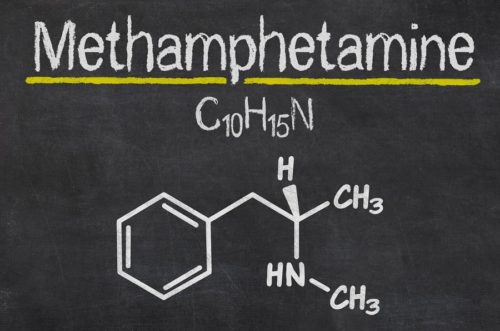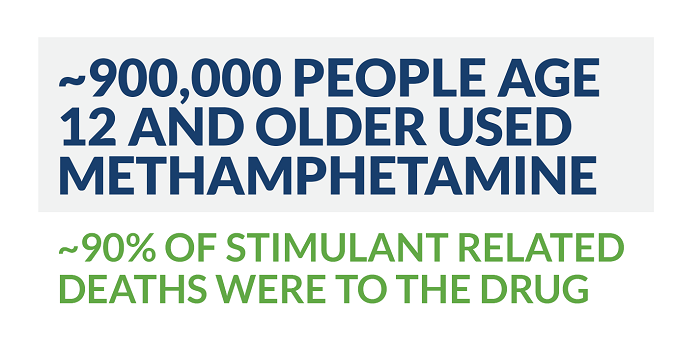Meth Addiction Treatment and Rehab
Methamphetamine (meth) is an extremely potent, highly addictive psychostimulant with chemical properties resembling amphetamine. Although methamphetamine is legitimately used to treat behavioral disorders such as (ADHD) and incorporated into short-term weight loss regimens, the toxic, long-term effects of the drug overshadow its short-term benefits.
Designated a Schedule 11 narcotic by the Drug Enforcement Administration (DEA) and tightly regulated under the Comprehensive Methamphetamine Control Act of 1996—the drug is illicit in every form other than non-refillable pharmaceutical prescriptions. Methamphetamine is commonly sold on the street as a fine, crystalized white powder under monikers such as “blade,” “quartz,” “chalk,” “crystal,” “ice,” and “glass, ” and can be smoked, snorted, injected or orally dissolved.
Methamphetamine was originally synthesized in the late 1800s by Japanese scientists and used by soldiers during World War 11 to increase alertness on the battlefield and prevent fatigue. In the decades following the war, the drug’s popularity skyrocketed. It is now mass produced in underground labs and smuggled across foreign and domestic borders by cartels.
Recent statistics from the Department of Justice (DOJ) and Centers for Disease Control and Prevention (CDC) paint a dire portrait. In 2017, approximately 900,000 people age 12 or older used methamphetamine, and approximately 90 percent of stimulant-related deaths were attributable to the drug. These figures represent a record 225 percent increase in stimulant-related deaths in the past decade, with recent projections showing no sign of stopping. Methamphetamine’s addictive charms should never be underestimated.
METHAMPHETAMINE ADDICTION
A surge in recreational use has spawned a black market of users willing to pay top dollar for methamphetamine’s euphoric effects which include feelings of power and confidence, dramatically increased energy levels, enhanced productivity, improved sexual performance, and decreased appetite. However, these fleeting benefits hide the underlying reality of death and destruction that methamphetamine exacts on chronic users— all of whom need professional medical treatment in order to safely recover physically, emotionally and psychologically.
Similar to other addictive substances, regular methamphetamine use creates dependency and, ultimately, addiction. One of the primary mechanisms involved in producing the pathological changes associated with chronic meth use is dopamine— a major pleasure neurotransmitter. Elevated dopamine levels trigger a mind-altering surge of “feel good” chemicals which render a user in need of greater quantities of the drug and more frequent use. In effect, this artificial manipulation of neurochemistry becomes a vicious circle or bottom pit, never capable of being filled regardless of the extreme users may go to fill it.
METHAMPHETAMINE WITHDRAWAL
Methamphetamine is devastating to the human body, even when used recreationally in small quantities. As a psychostimulant, it wages war on the cardiovascular system, disrupting regular heart rhythm and function and creating abnormal blood clots that may lead to a heart attack.
Short-term effects may also include:
- Severe malnutrition
- Extreme weight loss
- Insomnia
- Tooth decay
- Damaged nasal passages
- Oral sores and infections
- Injury to kidneys, liver and lungs
By the time a methamphetamine user suffers from full-blown addiction, withdrawal symptoms inevitably appear with cessation of use, or even in brief lapses between doses. Depending upon whether or not a user is in early or late-stage withdrawal, the following cluster of symptoms may appear:
- Depression
- Fatigue
- Paranoia/ psychosis
- Loss of motivation
- Incoherence
- Suicidal ideation (SI)
- Increased appetite
- Red, itchy eyes
- Disorientation
- Coma
Methamphetamine withdrawal is known for being a slow, agonizing process defined by three formal stages: the crash, subsequent cravings and recovery. Although the primary withdrawal process can last up to 40 weeks or longer, the most intense and debilitating symptoms appear within 24 to 48 hours following dosage. This is largely due to the fact that methamphetamine is considered a fast-acting psychostimulant which is metabolized quickly in the majority of users. It also exhibits a short “half-life,” meaning the time it takes for levels of methamphetamine present in the blood stream to be reduced by half.
During the early phase of the withdrawal process, professional medically guided detox is critical to achieving favorable long-term treatment outcomes. Those who attempt to administer self-guided detox or treatment place themselves at incredible risk for overdose and other debilitating consequences. Methamphetamine is a widely feared and incredibly potent drug, and attempting at-home treatment is analogous to playing with a loaded gun. It should never, under any circumstances, be attempted!
TREATMENT OPTIONS
Fortunately, the substance abuse treatment industry has undergone a revolution in recent years, both in terms of quality-of-care and available treatment options designed for a diversity of clients. Methamphetamine treatment options include:
- Intensive inpatient treatment – This popular treatment protocol involves clients living at a designated residential facility, usually for a period of one month, but sometimes as many as three. During a client’s stay, a combination of pharmacological and psychotherapy is utilized. The 24/7 staff monitoring and safe, supportive environment offered by such facilities are generally regarded as the industry “gold standard” and provide optimal social and therapeutic benefit to methamphetamine users requiring premium level of care.
- Intensive outpatient treatment (IOP) – This less intensive treatment protocol involves clients attending a designated treatment facility on a non-residential basis, usually for sessions three to five times per week. During the course of IOP, clients are also administered various pharmacological interventions and participate in group and individual therapy. Although IOP programs boast many benefits and are convenient for those with demanding personal or professional schedules, they are not considered optimal when dealing with a stimulant as potent and debilitating as methamphetamine.
- Outpatient treatment (OP)—this least intensive protocol involves clients attending a casual once or twice a week schedule of individual and/or group therapy, in addition to occasional medical follow-up and consultation. OP treatment is never recommended as a first intervention for methamphetamine users, although it is appropriate as a progressive stage in continuing care upon successful completion of an intensive inpatient or IOP treatment program.
MEDICATIONS USED IN EARLY RECOVERY FROM METH ABUSE
Methamphetamine treatment includes ongoing psychotherapy combined with evidence-based Food and Drug Administration (FDA)-approved pharmacological interventions. In addition to whatever supplemental medications are used to treat co-occurring mood disorders and other precipitating factors involved in methamphetamine addiction, the following medications form the staple of treatment:
- Antipsychotics—these medications, available in a variety of forms and dosages, help calm agitation, reduce panic attacks and curb underlying anxiety.
- Benzodiazepines “benzos”—help reduce the intensity and longevity of insomnia, psychosis and other adverse psychological effects.
- Antidepressants—help reduce depression and eliminate insomnia and/or anhedonia with regular dosage. In many clients suffering from clinically significant depression, antidepressants are a key ingredient of effective treatment.
Beyond the scope of medications and ongoing therapy using a variety of evidence-based modalities, emerging research suggests the following as part of an empirically proven relapse prevention strategy:
- Alcoholics Anonymous (AA) or Narcotics Anonymous (NA) involvement
- Faithfully working a 12-step recovery program
- Firm commitment to establishing a mentor-student relationship with a sponsor
- Ongoing sober peer support and recreational activities
- Healthy lifestyle choices, including regular exercise and a nutritious diet
- Developing a personal spiritual life and faith in a higher power
SEEKING HELP
If you or someone you love is suffering from methamphetamine addiction, contact a substance abuse professional today. Most are highly knowledgeable about treatment specifics and extremely helpful resources that can help make the difference between life and death. Action delayed is action lost— especially with regard to the ticking time bomb of methamphetamine addiction.
As you take the steps necessary to obtain the help you need, always remember that addiction is not a sign of personal failure or underlying character defect. Rather, it is a learned response to physical, emotional and psychological trauma and stressors that can be effectively overcome with commitment and discipline. Even in cases where addiction is particularly severe or the result of known genetic tendencies, long-term sobriety and a healthy, functional life are entirely possible.
Finally, remember that methamphetamine overdose is considered a medical emergency to be treated immediately at your local emergency room (ER) or intensive care unit (ICU). Prompt, decisive action can prevent an already dangerous situation from becoming deadly.
For more about methamphetamine addiction and recovery, check out these related articles:
- “Top 10 Signs of Addiction”
- “Experimentation vs. Addiction—How to Tell the Difference”
- “What is Holistic Rehab?”
- “Why Early Intervention for Addiction is Critical”
Sources:
Journal of Psychiatry and Neuroscience. The need for speed: an update on methamphetamine addiction. Sept, 2006.
Canadian Medical Association Journal (CMAJ). The burden and management of crystal meth use. June, 2008.
Pharmacological Research. Methamphetamine: Effects on the brain, gut and immune system. June, 2017.
Scientific Reports. Effects of methamphetamine abuse on spatial cognitive function. April, 2018.


